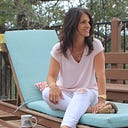Daring Action
I was never encouraged in my upbringing to be a risk taker. In fact, it was always the opposite. My father always warned me not to challenge the status quo, not to go outside the box, not to take a jump. Save your money; don’t spent it. Stay at home; don’t travel. You don’t need any of that, he’d say. I was taught that risk taking was dangerous and unnecessary. That way of thinking never resonated with me though. Although it’s scary at times, I know that taking daring action is what will make me grow as a person, an educator, a human being.
Our role as teachers is to facilitate learning. That learning comes in great waves when we can get our students to take risks. We expect them to dare greatly in their learning. As Brené Brown said, “Every day we experience the uncertainty, risks, and emotional exposure that define what it means to be vulnerable or to dare greatly. … Daring Greatly is not about winning or losing. It’s about courage. In a world where “never enough” dominates and feeling afraid has become second nature, vulnerability is subversive.” But how often do we as their teachers, dare greatly ourselves as adults?
Two years ago I had decided to write a book and self-publish it, but it was a risk I was taking. A risk of offending people, a fear of judgement, fear of exposure, fear of people lashing out at me, and worry that I might offend my colleagues, my family, and my students’ families. It was all fine with just me reading the words I had put on the page, but I had this terrible fear of people reading this stuff! This was embarrassing, this was raw, this was political, this was offensive to some, this was ugly. I was taking a risk putting it all out there and I wasn’t sure if I myself was ready to dare greatly.
I asked myself why I was going through with publishing my book. Other than following through with a task I started, it was ultimately to help people and to shed light on adversity. It was to tell people who were going through the same or something similar that they weren’t alone. It was to shed light on what adversity so many children were going through on a daily basis. I had no one to connect with when I was going through it myself. It could’ve been a lot easier for me if I knew other people went through this stuff, too.
Through it all I have learned that the key is not to be afraid of taking risks and not to look for anyone who may tell me I’m not smart enough, good enough, or important enough. It’s also not about waiting around for the perfect time either. Like Light Watkins says, we have to remember that nearly every great idea, book, film, or song we’ve enjoyed was created by someone just like ourselves who had many of the same excuses we may have for not putting ourselves out there, except one day they decided that taking daring action on their idea was worth the extra effort.
It has become for me about taking risks, having faith, standing in the face of others who may possibly lash out at me, and ultimately being true to my calling and my higher good. I had to pay attention to our higher purpose and to remember that spark that comes from connection and communication with others. Everything’s better when you share it.
So I take the risk every time I put myself out there on Twitter, Instagram, on Medium, or when I send my book proposal to an agent, wondering if anyone even wants to hear what I say, with the fear that no one cares. I share my thoughts about education, childhood adversity, social justice in schools. Since I have done this, I’ve begun to see (and I hope our students do, too) that as we courageously take risks in this ‘life as a classroom’ and share, we receive support, inspire others, discover unexpected connections, we learn, and we live in community.
One last thought shared by George Couros, an innovative educator and author of The Innovator’s Mindset. “If we don’t take those risks, if we don’t try some new things; does that actually hurt us long term, is that actually a bigger risk that we are not taking?”
